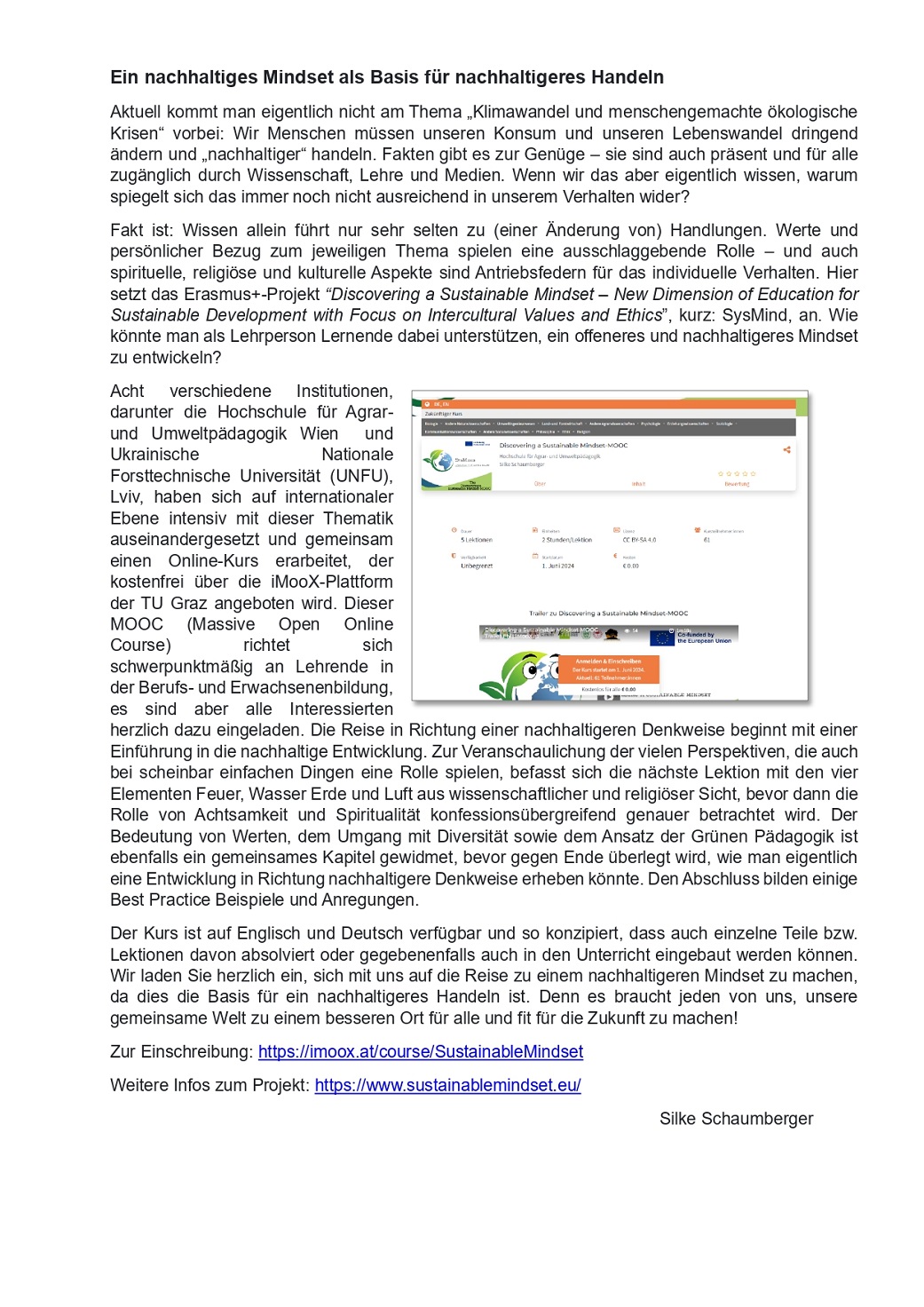- Деталі
- Категорія: Новини проєкту SysMInd

- Деталі
- Категорія: Новини проєкту SysMInd
Currently, there is no way ignoring climate change and man-made ecological crises: We humans urgently need to change our consumption and lifestyles and act more “sustainably”. There are plenty of facts - they are also available and accessible to everyone through science, teaching and the media. But if we know this, why is it still not sufficiently reflected in our behaviour?
The fact is that knowledge alone very rarely leads to (a change in) actions. Values and personal relation to the respective topic play a decisive role – and additionally, spiritual, religious and cultural aspects are also driving forces for individual behaviour. This is where the Erasmus+ project “Discovering a Sustainable Mindset - New Dimension of Education for Sustainable Development with Focus on Intercultural Values and Ethics”, short: SysMind, comes in. How can teachers support learners in developing a more open and sustainable mindset?
Eight different institutions, together with the University of Agricultural and Environmental Pedagogy Vienna and Ukrainian National Forestry University (UNFU) in Lviv have dealt intensively with this topic at an international level and jointly developed an online course that is offered free of charge via the iMooX platform of Graz University of Technology. This MOOC (Massive Open Online Course) is primarily aimed at vocational and adult education teachers, but all interested parties are welcome to participate. The journey towards a more sustainable way of thinking begins with an introduction to sustainable development. To illustrate the many perspectives that play a role even in seemingly simple things, the next lesson looks at the four elements of fire, water, earth and air from a scientific and religious perspective, before taking a closer look at the role of mindfulness and spirituality across all denominations. A joint chapter is also dedicated to the importance of values, dealing with diversity and the green pedagogy approach, before considering how we could move towards a more sustainable way of thinking towards the end. The course concludes with some best practice examples and suggestions. The project participants from UNFU prepared two lectures for this online course: a theoretical lecture on the essence of ecological economics, and a lecture on best practices in implementing of education for sustainable development in Ukraine.
The course is available in English and German and is designed so that individual parts or lessons can be completed or, if necessary, incorporated into lessons. We cordially invite you to join us on the journey to a more sustainable mindset, because this is the basis for more sustainable action. And it takes all of us to make our shared world a better place for everyone and fit for the future!
Subscription for the course: https://imoox.at/course/SustainableMindset
Further information: https://www.sustainablemindset.eu/
Absolutely-Intercultural-Podcast of the RheinAhrCampus: https://www.absolutely-intercultural.com/?p=5296).
Brief information is already available also on the Austrian platform for Global Learning and Education for Sustainable Development “Bildung2030”, in the section further education: https://bildung2030.at/fortbildung/online-kurse/
Silke Schaumberger, SysMind Project leader
Lyudmyla Maksymiv, UNFU-Project coordinator
- Деталі
- Категорія: Новини проєкту SysMInd
Сьогодні неможливо ігнорувати зміни клімату та екологічні кризи, спричинені людською діяльністю. Нам, людям, потрібно терміново змінювати свій стиль життя, зокрема, звички щодо споживання, і діяти більш «стало». Фактів, що підтверджують необхідність таких змін, багато - вони доступні кожному через науку, навчання та засоби масової інформації. Але якщо ми про все це знаємо, чому це ще недостатньо відображено в нашій поведінці?
Справа в тому, що знання самі по собі дуже рідко призводять до (зміни) дій. Вирішальну роль відіграють цінності та особисте ставлення до відповідної теми. Крім того, рушійними силами індивідуальної поведінки є духовні, релігійні та культурні аспекти. Саме тут вступає в дію проєкт Erasmus+ «Відкриваємо для себе сталий спосіб мислення - новий вимір освіти для сталого розвитку з акцентом на міжкультурні цінності та етику», скорочено: SysMind. Як викладачі / вчителі можуть підтримати своїх студентів / учнів у розвитку більш відкритого та сталого способу мислення?
Вісім різних установ разом з Віденським університетом сільськогосподарської й довкільної педагогіки та Національним лісотехнічним університетом України (НЛТУ України), м. Львів, спільно розробили онлайн-курс, який пропонуємо безкоштовно через платформу iMooX Технічного університету м. Грац, Австрія. Цей масовий відкритий онлайн-курс (MOOC - Massive Open Online Course) призначено насамперед для викладачів професійно-технічної освіти та освіти дорослих, але до участі запрошуються всі зацікавлені особи. Подорож до більш сталого способу мислення морозпочинається зі знайомства з концепцією сталого розвитку. Щоб проілюструвати чинники, які відіграють роль навіть у, здавалося б, простих речах, у наступній лекції розглянуто чотири стихії - вогонь, воду, землю і повітря - з наукового та релігійного погляду, а відтак - роль усвідомленості та духовності в різних конфесіях. Окремий розділ присвячено важливості цінностей, різноманітності та підходу «зеленої» педагогіки. Наприкінці йдеться про те, як ми можемо перейти до більш сталого способу мислення. Курс завершується прикладами найкращих практик та пропозиціями, які викладачі зможуть використати у своїх навчальних дисциплінах. Учасники проєкту від НЛТУ України підготували дві лекції для цього онлайн-курсу: теоретичного спрямування про сутність екологічної економіки і поділилися досвідом втілення освіти для сталого розвитку в Україні.
Читати далі: Сталий спосіб мислення як підґрунтя для більш сталих дій
